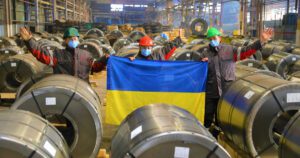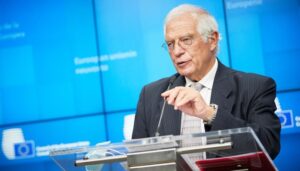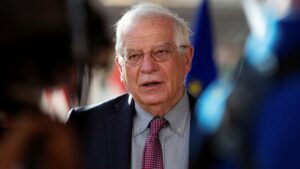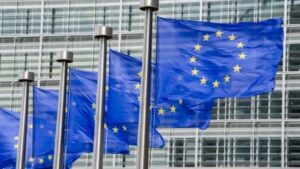
Zaporizhia metallurgical plant Zaporizhstal has mastered the production of double-mass cold-rolled coil without a welded seam – the first batch of a new type of rolled metal for the construction industry has already been shipped.
According to the information of the company on Friday, the plant mastered the first new type of product this year – a cold-rolled coil of double mass without a seam with dimensions of 1.5-2.0×1370-1500 mm. The enterprise has already shipped 3,600 tonnes of a new type of rolled metal for the construction industry.
The company said that a request had been received from potential consumers from Europe.
“They wanted rolls of the fourth type of rolled products with a width of 1500 mm, but at the same time the weight of the rolls would be at least 9 tonnes. We had already produced similar products before, but it was necessary to review the technology. We almost immediately began to develop a new type of rolled products,” Deputy Head of the cold rolling shop (CHP) in charge of production Serhiy Kuzmenko, who is quoted by the company’s press service, said.
He added that the new technology was developed quickly: 14 days passed from the client’s request to the production of the first trial batch of rolls.
At the same time, earlier the company produced rolls weighing up to 8 tonnes and 3.8 mm thick. To obtain such a coil, two lightweight coils were welded in the BTA-4 line in the cold rolling shop and coils with seams were obtained. Now the production technology has changed. New coils are produced in the hot rolling shop, and their thickness is changed in the cold rolling shop. Thanks to the new production technology, it was possible not only to master a new type of product, but to save about UAH 1 million due to its implementation.
In addition, the efficiency of the pickling unit and the efficiency of the rolling mill have increased. Also, due to the fact that products are packaged not in small rolls up to 8 tonnes, but in large ones, up to 16 tonnes, the cost of packaging materials is almost halved, the company said.

The European Union will provide an additional EUR 500 million in military assistance to Ukraine, bringing the total amount of aid to EUR 2 billion, High Representative of the EU for Foreign Affairs and Security Policy Josep Borrell said on Friday.
He said the European Union would provide a new tranche of EUR 500 million to provide military assistance to Ukraine, thus, bringing the total amount to EUR 2 billion.

The head of European diplomacy, Josep Borrell, believes that the EU could withdraw Russian reserves stored in Europe and send them to the restoration of Ukraine.
“I would strongly advocate for it, as it is completely logical,” he said in an interview published in The Financial Times on Monday.
“The European Commission has said that restoring Ukraine could cost hundreds of billions of euros, and European capitals could consider seizing Russian assets frozen abroad to help pay for Ukraine’s rebuilding (…)”, the FT quoted the words as saying. Borrell.
At the same time, Borrell drew an analogy with Afghanistan – the United States took control of billions of dollars of assets belonging to the Central Bank of Afghanistan in order to possibly use them in part to compensate victims of terrorism, as well as to provide humanitarian assistance to the country.
“We have money in our pockets, and someone has to explain to me why it’s good to do this with Afghan money, but not with Russian money,” Borrell said.
“EU representatives have considered whether it is possible in any way to direct Russia’s reserves to the reconstruction of Ukraine, but Brussels has not moved forward with any political proposals on this topic,” the publication notes.
The FT recalls that “shortly after the start of the conflict, the EU and its allies froze hundreds of billions of dollars of foreign assets of the Central Bank of Russia.”
BORRELL, EU, FINANCIAL TIMES, REBUILD UKRAINE, RUSSIAN FUNDS

The Ministry of Education and Science of Ukraine is working on the organization of centers for the national multi-subject test in the countries of the European Union and the UK.
“Now we are working on organizing the work of national multi-subject test centers abroad. Minister Serhiy Shkarlet made a relevant request to his colleagues in European countries,” the ministry’s press service said in a statement.
It is noted there is already a preliminary agreement on two centers in Germany, two in Italy and six in Poland, since most Ukrainian children are in this country.
CENTERS, EDUCATION MINISTRY, EU, MULTI-SUBJECT TEST, ORGANIZATION, UK

The European Union proposes to ban real estate transactions in the territory of the union with citizens, residents and legal entities of the Russian Federation within the framework of new sanctions against Russia, Bloomberg reports with reference to a document on the planned sanctions.
“The proposal of the European Commission provides for the termination of real estate transactions with Russian citizens, residents and legal entities, prohibiting the sale or transfer, directly or indirectly, of “ownership rights in real estate located in the territory of the Union, or shares in collective investment enterprises providing access to such real estate,” the agency writes.
The proposed ban applies to Russians who are not EU citizens and do not have a residence permit in the union countries. The measure does not apply to those who have citizenship or a residence permit in the European Economic Area or Switzerland.
Bloomberg notes that the measure itself will come into force if the corresponding proposal is approved by EU member states this week.
Earlier on Wednesday, the head of the European Commission, Ursula von der Leyen, said that among other sanctions proposed by the European Commission are the disconnection of three Russian banks, including Sberbank, from the SWIFT international payment system, a ban on broadcasting in the EU of three major state-owned Russian television channels, as well as a ban on providing Russian companies of services of a number of European specialists. In addition, the EC is proposing a phase-out of Russian oil imports, which von der Leyen said should take six months and be completed by the end of 2022.

The European Commission will soon submit a report on the readiness of Moldova, Ukraine and Georgia to join the European Union, European Council President Charles Michel said.
“We discussed in detail the issues of EU enlargement a few months ago, at the conference in Versailles. After that, three countries applied for accession. We made a decision very quickly, instructing the European Commission to carry out work and prepare reports on these countries. We made a decision in a few days, although it usually took 8-9 months. By the end of June, the European Commission will publish this report, and we will decide how to proceed further,” Michel said at a joint press conference with Moldovan President Maia Sandu during a visit to Chisinau.
He stressed that the EU will continue to act promptly.
“We will act immediately to strengthen ties with Moldova, Ukraine and Georgia, to support them in the current difficult situation. This will be a political process in the context of how we see the development of the European Union. In the next two months, we will give a clear signal of what we want to enlarge the European Union,” the President of the European Council said.
For her part, Moldovan President Maia Sandu stressed that “European integration is the choice of the country, the choice of the people.” “On April 22, we submitted to Brussels the first part of our responses to the European Commission’s questionnaire. In the near future we will also pass on the second part. We understand that integration into the EU is a long process, we are not looking for short and easy ways. We intend to continue reforms. Most importantly – peace is needed for this, everything must be done to restore peace,” Sandu stressed.